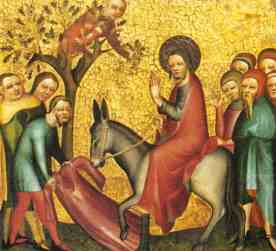
Today’s reflection is from guest contributor Flora x. Tang. Flora is a doctoral candidate in theology and peace studies at the University of Notre Dame. She is originally from Beijing, China and now lives in South Bend, Indiana.
The liturgical readings for Palm Sunday can be found here.
Six years ago, in the middle of leading a Palm Sunday opening procession from the exterior of my church to the altar, I came out as queer.
Or a better way to put it might be that I decided this liturgically-maximalist Palm Sunday procession would be the most fitting feast day that I could choose to commemorate every year as my “coming out anniversary.” With my lips chanting the familiar Hosana Filio David hymn and my right hand lazily waving a palm branch, I told myself—and perhaps also told God— that yes, I am queer, and that yes, I am loved.
 For several years before coming out, the experience of coming to terms with my sexuality was a slow and prayerful process of introspection and discernment. Unlike how movies about gay people might portray the experience of coming out (cue Love, Simon), this was never a clear-cut, lightbulb moment of realizing my sexuality with immediate certainty.
For several years before coming out, the experience of coming to terms with my sexuality was a slow and prayerful process of introspection and discernment. Unlike how movies about gay people might portray the experience of coming out (cue Love, Simon), this was never a clear-cut, lightbulb moment of realizing my sexuality with immediate certainty.
But if realizing that I was queer was a confusing and drawn-out process, the idea of “coming out” was even more so. In both Catholic spaces and beyond, “coming out” as queer looked less like verbally declaring my sexuality to the entire world once and for all, and more like using a combination of hints and subtle cues to indicate my queerness to those I perceived as affirming, and to shielding queer parts of myself away from those who may not be so. Living as a queer person means navigating these never-ending uncertainties and subtleties on a daily basis.
This dynamic was perhaps why selecting one of the most distinctly glorious and liturgically extravagant days of the liturgical year as the day to commemorate my coming out seemed fitting: on Palm Sunday, we read the gospel of Jesus’ glorious entrance into Jerusalem and his ultimate death on the cross. On Palm Sunday, we proclaim that God loves us, even to the point of God’s own death. When on Palm Sunday I came out to myself and to God, I was certain—and rested comfortably in the certainty—that God loves me for who I am because he died for me.
But today’s gospel reading, which this liturgical year is from the Gospel of Mark, tells a narrative where Jesus—having spent the majority of this gospel hiding his identity as Messiah from his community— reveals himself as the Messiah, and is then killed by the Roman authorities because of this scandalous revelation. His “coming out” results in violence.
As an academic committed to nonviolence and peace, this perspective has made my relationship with Palm Sunday grow uncertain. If all are called to follow Jesus in his life and self-giving death, are we, as queer Catholics, also called to a life of suffering, ostracization, and perhaps even death because we choose to reveal who we are? Are we, as many Catholic teachings on gender and sexuality have repeated, to “embrace our own crosses?” Or, are we always called, as dominant gay narratives in the U.S. suggest, to always be willing to come out as queer no matter the possible risks or dangers we may face as a result?
I would love to answer a resounding “NO” to all these questions and tell all who doubt that they are loved beyond question. But the gospel stories of Palm Sunday and Holy Week–and how people have been interpreting these gospels for centuries–are difficult to offer a simple, clarifying affirmation.
For example, I still don’t know why in a world already filled with so much violence, that a loving God’s self-revelation and death on the cross marks one of the holiest weeks of our Catholic tradition. I profess by faith—yet still do not truly know—whether Jesus’ own suffering and death is truly something we should always emulate. In a world already filled with the unjust killing and death of marginalized people, I do not know why violence and death are held up on a pedestal of holiness in our faith tradition, or why queer Catholics are always called to embrace their own crosses of self-renunciation.
I do not know, and more importantly choose not to believe, that self-denial and long suffering are the only ways to live a life of Christ-like love. I wish to pray instead for safety, for life, for companionship, for joy, and for flourishing for all my queer and trans siblings. I pray for a world where queer children do not die. And I pray for a world where deaths are mourned rather than glorified.
I came out as queer on Palm Sunday because of the Passion narrative’s resounding proclamation of God’s unceasing love for me, even to the point of death. The certainty of a Jesus who died for me offered me solace in a time when my queer experience and my queer future were murky and confusing. I am not so sure anymore whether the image of an incarnate God-the-Son who died on the cross can continue to give me and other queer people hope and comfort in a violent, anti-queer church and world.
But my yearly commemoration of this Palm Sunday-qua-coming out feast day (and all the queer joy in my own life that followed that day six years ago) gives me a reason to continue trying, and continue hoping.
—Flora x. Tang, March 24, 2024